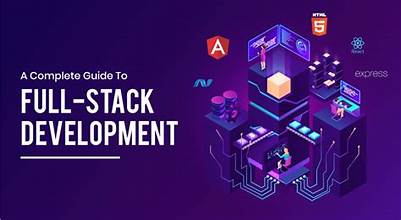In the fast-paced world of technology, businesses are constantly seeking ways to enhance their online presence and deliver innovative digital solutions to their customers. Full Stack Development Services have emerged as a cornerstone in the realm of web development, offering comprehensive solutions that encompass both front-end and back-end development. This article explores the essence of Full Stack Development Services, their core components, benefits, and their pivotal role in shaping the digital landscape.
Understanding Full Stack Development Services
Full Stack Development Services encompass the entire spectrum of web development, from designing and building the user interface to managing databases and server-side logic. Unlike specialized developers who focus solely on front-end or back-end technologies, full stack developers possess a versatile skill set that allows them to handle all aspects of web development seamlessly. This holistic approach enables Full Stack Development Services to deliver end-to-end solutions that meet the diverse needs of businesses across industries.
Core Components of Full Stack Development Services
Front-end Development:
Front-end development involves crafting the visual elements and user interface of a web application. Full stack developers leverage technologies such as HTML, CSS, and JavaScript, along with frameworks like React, Angular, or Vue.js, to create responsive and interactive user interfaces that enhance the overall user experience.
Back-end Development:
Back-end development focuses on server-side programming and database management. Full stack developers utilize languages such as Node.js, Python, Ruby, or PHP, along with frameworks like Express.js, Django, or Flask, to build robust server-side logic and APIs. They also work with databases like MySQL, MongoDB, or PostgreSQL to store and manage data efficiently.
Database Management:
Effective database management is crucial for the performance and scalability of web applications. Full stack developers design, implement, and optimize databases to ensure seamless data storage, retrieval, and manipulation, while also ensuring data integrity and security.
DevOps and Deployment:
Full stack developers are well-versed in DevOps practices and tools for continuous integration and deployment. They use platforms like Docker, Kubernetes, or AWS to automate deployment processes, ensuring smooth deployment and scalability of web applications.
Benefits of Full Stack Development Services
Cost Efficiency:
By leveraging Full Stack Development Services, businesses can save costs associated with hiring separate specialists for front-end and back-end development. With a single team handling all aspects of web development, overhead costs are reduced, resulting in overall cost savings.
Faster Time-to-Market:
Full Stack Development Services enable faster development cycles and quicker deployment of web applications. With a cohesive team working on all components of the project, communication is streamlined, leading to improved efficiency and faster time-to-market.
Versatility and Flexibility:
Full stack developers are adaptable and can work on a wide range of projects, from simple websites to complex web applications. This versatility allows businesses to tackle diverse projects with a single development team, making Full Stack Development Services a flexible and scalable solution.
Seamless Communication:
With Full Stack Development Services, businesses have a single point of contact for all development needs. This streamlines communication, enhances collaboration, and simplifies project management, leading to smoother development workflows and better outcomes.
Enhanced Problem-solving Abilities:
Full stack developers possess a comprehensive understanding of the entire web development process, enabling them to identify and troubleshoot issues more effectively. This results in quicker problem resolution, improved stability, and higher-quality web applications.
The Role of Full Stack Development Services in Shaping the Digital Landscape
Full Stack Development Services play a pivotal role in shaping the digital landscape by empowering businesses to harness the full potential of web development. By offering end-to-end solutions that encompass both front-end and back-end development, Full Stack Development Services enable businesses to:
Drive Innovation: Full Stack Development Services empower businesses to bring innovative ideas to life by providing the technical expertise and resources needed to develop cutting-edge web applications.
Enhance User Experience: With a focus on both front-end and back-end development, Full Stack Development Services ensure that web applications are intuitive, responsive, and user-friendly, resulting in improved user experience and higher customer satisfaction.
Improve Efficiency: By streamlining the development process and providing a single point of contact for all development needs, Full Stack Development Services improve efficiency, reduce development time, and accelerate time-to-market for web applications.
Scale Seamlessly: Full Stack Development Services enable businesses to scale their web applications seamlessly to accommodate growing user bases and evolving business needs, ensuring scalability, performance, and reliability.
Stay Competitive: In today’s digital-first world, having a strong online presence is essential for businesses to stay competitive. Full Stack Development Services help businesses stay ahead of the curve by delivering innovative web solutions that differentiate them from competitors and drive growth.
Conclusion
Full Stack Development Services have become indispensable for businesses seeking to thrive in the digital age. By offering end-to-end solutions that encompass both front-end and back-end development, Full Stack Development Services empower businesses to drive innovation, enhance user experience, improve efficiency, scale seamlessly, and stay competitive in today’s fast-paced digital landscape. As businesses continue to prioritize their online presence, the demand for Full Stack Development Services is expected to grow, cementing their role as a cornerstone of modern web development.



